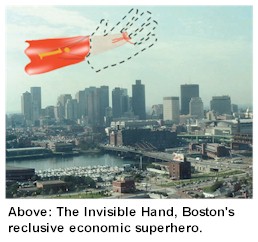BOSTON – Witnesses say the
reclusive superhero The Invisible Hand was responsible for the rescue last Wednesday of
1-year-old Sally Fairfield, who had crawled out the fourth-story window of her
family’s Back Bay apartment and was plummeting to certain death. 
"He saved her," said a tearful Greta Fairfield, Sally’s mother. "The Invisible Hand saved my baby. I’m so thankful."
Using his powers of insta-utility-maximization (see below), the Invisible Hand buffered Sally’s fall and returned her to her mother unharmed. As the gathered throngs cheered, the Hand flew off without a word, returning to his secret underground lair deep below the Federal Reserve Building downtown.
With his fantastic superpowers and a doctorate in economics from the University of Chicago, The Invisible Hand of the Marketplace has saved Boston from many a dire situation since the end of the last recession. Mayor Menino held a press conference today thanking the Hand for his heroism and offering him the keys to the city.
"For years, the Invisible Hand has helped rescue our fair city from disequilibrium," said Menino. "Wherever there is evil, wherever there is inefficiency, wherever there is suboptimal allocation of resources, the Invisible Hand is there to save us. We all owe him a great debt, a debt for which he has negotiated a steep but fair annual interest rate of LIBOR + 3%. Please remember that payments are due quarterly."
Others, however, were less happy with the Invisible Hand’s feat. Saving the baby shifted global demand in such a way as to force the closing of a General Motors plant in Flint, Michigan, displacing 1600 workers.
"This… so-called … ‘Invisible Hand’ purports to be a hero, when he in fact causes nothing but pain!" spat the Hand’s nemesis, Dr. Intervention, as he stroked a government-issued white Persian cat. "He is a rogue, a vulgarian, an … anarchist!"
Dr. Intervention cited other adverse effects of the Invisible Hand’s actions. Two years ago the Hand extinguished a fire in a triple-decker in Dorchester, causing service-sector jobs to erode in inner-city Los Angeles. And last summer, the Hand’s neutralization of a lethal 30-story tidal wave precipitated the collapse of the Malaysian ringgit.
While perennially the loser in his battles with the Invisible Hand, Dr. Intervention has sometimes been able to foil the Hand’s heroism with lethal rocks of "Regulite," a substance that takes away the Hand’s super powers.
In Cambridge, for example, large chunks of Regulite at City Hall stopped the Invisible Hand from rescuing the city’s desperate landlords, whom Dr. Intervention had imprisoned beneath a steel-reinforced rent ceiling. Thankfully, the Invisible Hand’s French sidekick Laissez Faire lobbied the city council to remove the Regulite, enabling the Hand to regain his super-equilibrating powers and free the landlords.
"I never would have gotten my posh Central Square apartment without the Invisible
Hand," said 25-year-old Lois Lang, a management consultant and recent Yale grad.
"He’s such a dream! It’s too bad my mild-mannered accountant boyfriend,
Adam Smith, never seems to be around to see him."
Economic superpowers
Witnesses say that the Hand performed his feat with his trademark powers of insta-utility-maximization. After slowing time to a crawl, the Hand contacted Greta Fairfield and asked her how much she would pay to save Sally.
"I told him that up to $17,500 I was inclined to save her, but above that price the marginal cost would outweigh the marginal utility gained," said Greta.
The Invisible Hand then contacted potential suppliers of such a service. One Boston fireman, Bob Richardson, jumped at the opportunity, hoping to supplement his meager government income.
"Noting that there were few suppliers of baby-saving services, I quoted Mrs. Fairfield a price of $50,000," said Richardson. "I seemed to have the market cornered."
While a few mothers did employ Richardson, Greta Fairfield balked at the price. But in the meantime, Randall Ferrere, owner of local flower delivery service Ferrere & Co., had noticed that there seemed to be a lot of money in baby-saving.
"I looked at the prices guys like Richardson were quoting and thought, there has to be a way to do this better and cheaper," said Ferrere. "The profit margins of the baby-saving services were far more attractive than those of my flower delivery service. Besides, I already had twenty drivers in different parts of the city and a dispatch office that communicated with the drivers via radio. This would enable each driver to save more babies per workday than a solo practicioner ever could."
Ferrere & Co. launched their service at a price of $10,000 per baby saved. Greta Fairfield excitedly called Ferrere to make an appointment, but received some bad news.
"They said that there was already a long waiting list for their service," said Greta. "The first time they could come out and save Sally was in early January. I was pretty upset. I asked them if there was any way that they could come earlier."
Ferrere realized that there was something not quite right with his pricing scheme.
"It occurred to me that some mothers might need faster service, and might be willing to pay extra for it," he said. Ferrere created a Premier Platinum service with a price of $16,000. Mrs. Fairfield scheduled the service and had Sally saved that instant.
"It seemed like a bargain to me," said Mrs. Fairfield. "Thank you, Invisible Hand!"
